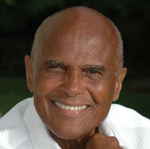Program canceled for personal reasons
Harry Belafonte has been a part of American culture for so long and in so many roles that his name conjures up a variety of responses.
 Belafonte
Belafonte
To the Greatest Generation, he broke through the color barrier in film, television and the recording industry; to Baby Boomers, he is best known as the “Banana Boat” singer; to subsequent generations, he is known as an outspoken humanitarian and civil rights pioneer.
In recent years, his activism has evolved into taking a stand against what he perceives as misguided American policy and questioning the country’s moral authority.
At 6 p.m. Monday, Oct. 25, Belafonte will speak in Graham Chapel on “The Moral Direction of America” for the annual Black Arts & Sciences Festival Lecture. Also sponsored by the Assembly Series, the talk is free and open to the public.
Born in New York City in 1927, Belafonte spent much of his childhood in Jamaica. As a teenager, he returned to New York to attend high school. He then served in the Navy during World War II.
After completing military service, he studied acting, along with many great American actors, at The New School. In 1954, he won the Tony Award for Best Featured Actor in a Musical (John Murray Anderson’s Almanac) and continued to forge a film and television career. In 1959, he crossed another milestone, becoming the first African-American man to win an Emmy Award for his television special, Tonight with Belafonte.
But it was his music that made him famous. His album “Calypso,” which introduced Calypso music to American audiences, became the first million-selling LP and included his signature song, the “Banana Boat Song.” Subsequent albums showcased his talent in several genres, including gospel, folk, blues and show tunes.
An early supporter of the civil rights movement, Belafonte opposed not only U.S. racial discrimination but also colonialism in Africa. A confidant of Martin Luther King Jr., Belafonte played a critical role by providing financial support to King’s family, raising money to release imprisoned civil rights activists, and helping finance the Freedom Rides. He also supported voter registration drives and helped organize the 1963 March on Washington.
In later years, Belafonte has helped raise awareness and funds for African crises and was involved in Live Aid and the Grammy Award-winning song “We Are the World.” As a UNICEF ambassador, Belafonte has traveled to Senegal, Rwanda and South Africa supporting humanitarian efforts; in 2002, he was awarded a distinguished humanitarian service award for these efforts.
For information on this program and upcoming Assembly Series events, visit assemblyseries.wustl.edu or call (314) 935-4620.